Conversations in Taos Pueblo
I appreciate great landscape photography, and strive to improve my technique because I often travel to beautiful places. But my true love is photojournalism, and after days of snapping gorgeous scenery, I was happy for the chance to photograph people and their living conditions in Taos Pueblo.
After the previous day's trauma, I made sure I would arrive in plenty of time, even with a few stops along the High Road. But at 8AM in the summer the light was already brighter than I would like, and the pueblo seemed to run on Old Mexico time...not ahora, but ahorita. The clerk languidly opened the ticket window around 8:30.
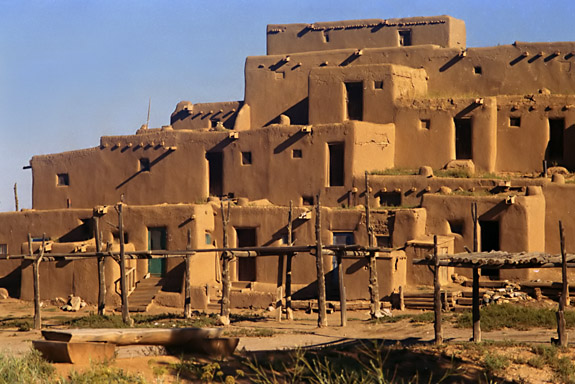
The North House, a beautifully-preserved adobe apartment complex
Taos Pueblo, A UNESCO World Heritage site, has been occupied for about 1000 years. Set at the foot of the Sangre de Cristo mountains, this picturesque village has about 150 full-time residents carefully preserving its condition. This is successfully achieved by charging $10 entry and an additional $5 camera fee; a quick search online yields photos and illustrations from 100 years ago showing the pueblo looking exactly as it does today, other than the current use of cars.
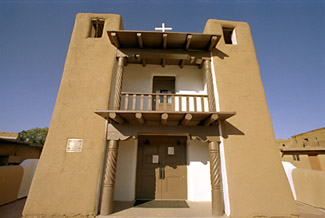 San Geronimo church |
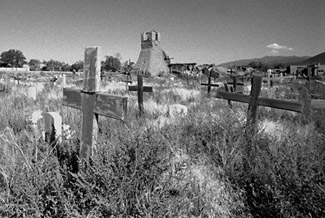 Old San Geronimo church ruins |
At opening hour on Labor Day, most of the town's residents had not quite set up for business. There was no food, there were no jewelry stalls, there were only dogs roaming around...many dogs, considering the size of the village. It was peaceful and beautiful wandering around the large adobe complexes, which were entered through the rooftops by ladder.
I was a little disappointed at the lighting; photography here would be best in winter's shorter daylight hours, or in the afternoon. I remembered that the previous afternoon, mountain views had been much clearer from Taos. This morning they were hazy.
I was having difficulty photographing people as well. Not for the first time, I realized I am not comfortable pointing the camera at my fellow Americans.
I met Paul while wandering through one of the back areas near the cemetery. Trying not to trespass but also unsure what constituted trespassing, I was grateful when he beckoned me toward him. Paul was born and raised in the pueblo, and owned two houses. Today, he was fixing a collapsed roof.
A former teacher in Taos, Paul resignedly described the everyday racism his Indian students faced. He knew it wasn't acceptable, but also didn't know how to fix the ignorance on display. My own history of racist treatment didn't offer any explanations either. I'd usually faced ignorance in places where Asians were few, but in New Mexico, Indians are fairly common.
Paul went camping in the mountains almost weekly. He told me with a wicked grin that on my next visit, I should bring a sleeping bag.
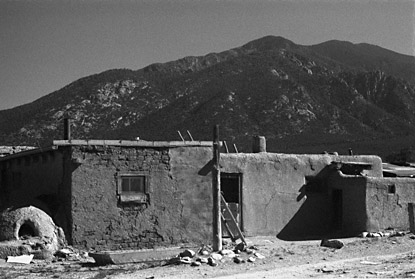 "This is my church," he declared, taking in the Sangre de Cristo mountains with a sweeping gesture. "Down there, it's all tidy and plastic. I mean...no offense."
"This is my church," he declared, taking in the Sangre de Cristo mountains with a sweeping gesture. "Down there, it's all tidy and plastic. I mean...no offense."
Modern life wasn't all bad, however. Taos Pueblo did not have running water, and Paul conceded he enjoyed a shower now and then in town.
The food sellers had set up by mid-morning, but no one had the incredibly unhealthy-sounding frybread that so intrigued me...just cookies and bread. I decided to save my appetite. The jewelry sellers had set up as well, but nothing was quite as pretty as what I'd seen in Santo Domingo.
A young, fat jewelry seller was amazed I came from New York. He engaged me in a long, rambling, somewhat one-sided conversation.
"New York! The city that never sleeps, right? That's what they call it. I don't think I could stay up past 11. But in New York, people don't sleep. So they say. How many days have you ever gone without sleep?"
Oh...I don't think that's really meant literally.
"Yeah, I really need my sleep, I can't usually stay awake past 11, you know? I mean, is every place in New York open 24 hours? We don't have that here. Except for some gas stations. Oh, and the Frontier in Albuquerque is open 24 hours. But no, people here like to have sleep. Still, I think I should work on going longer without sleep."
Er...really?
"I was thinking maybe I could be a truck driver. I think I'd be really good at that but you need to not sleep for long times. Yeah. I think, while I'm still young, if I can stay healthy, I could be a good truck driver. The gas stations are open 24 hours. If I can stay awake long enough, maybe in the next few years I'll be a driver."
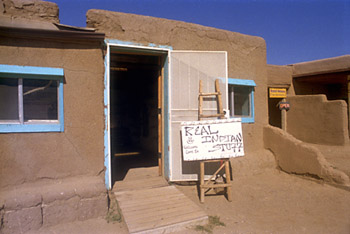 "Real Indian Stuff" |
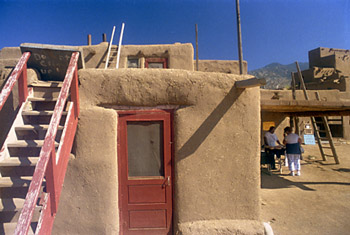 The chatty seller was in that shaded spot |
I regretted that I'd never been enough of a journalist to really feel comfortable questioning people beyond small talk. I wanted to know so much, but I felt awkward simply asking people about the opportunities available to them, about the poverty they dealt with on the reservations, about the general lack of good health among the Indians, about educational problems. But Taos Pueblo sets itself up as a learning experience, and the residents are absolutely available to chat; for this reason alone Taos Pueblo is due a second visit in the future.